Related Research Articles
Discovered in the 1990s, the earliest human remains in the Democratic Republic of the Congo have been dated to approximately 90,000 years ago. The first real states, such as the Kongo, the Lunda, the Luba and Kuba, appeared south of the equatorial forest on the savannah from the 14th century onwards.

Politics of the Democratic Republic of Congo take place in a framework of a republic in transition from a civil war to a semi-presidential republic.

The Belgian Congo was a Belgian colony in Central Africa from 1908 until independence in 1960. The former colony adopted its present name, the Democratic Republic of the Congo (DRC), in 1964.
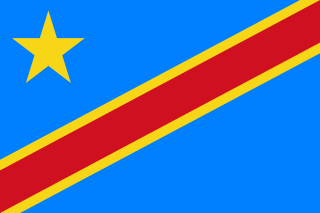
The Democratic Republic of the Congo (DRC), also known as Congo-Kinshasa, DR Congo, the DROC, or simply either Congo or the Congo, and historically Zaire, is a country in Central Africa. It is, by area, the largest country in sub-Saharan Africa, the second-largest in all of Africa, and the 11th-largest in the world. With a population of around 90 million, the Democratic Republic of the Congo is the most-populous officially Francophone country in the world, as well as the 2nd-most populous country in Africa, and the 13th-most populous country in the world. Since 2015, the Eastern DR Congo has been the scene of an ongoing military conflict in Kivu.
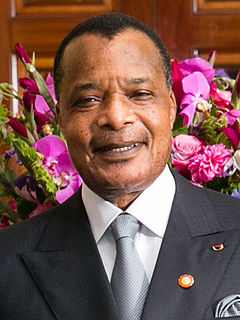
Denis Sassou Nguesso is a Congolese politician who has been President of the Republic of the Congo since 1997. He was previously president from 1979 to 1992. During his first period as president, he headed the single-party régime of the Congolese Party of Labour (PCT) for 12 years. Under pressure from international sources, he introduced multiparty politics in 1990 and was then stripped of executive powers by the 1991 National Conference, remaining in office as a ceremonial head of state. He stood as a candidate in the 1992 presidential election but was defeated, placing third.

Joseph Kabila Kabange is a Congolese politician who served as President of the Democratic Republic of the Congo between January 2001 and January 2019. He took office ten days after the assassination of his father, President Laurent-Désiré Kabila. He was elected as President in 2006 and re-elected in 2011 for a second term. Since stepping down after the 2018 election, Kabila, as a former president, will be a senator for life, according to the Constitution of the DRC.
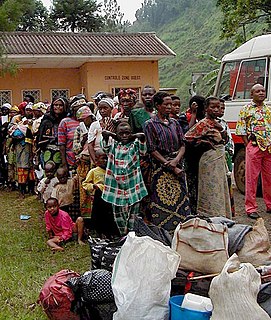
The Second Congo War began in the Democratic Republic of the Congo in August 1998, little more than a year after the First Congo War, and involved some of the same issues. The war officially ended in July 2003, when the Transitional Government of the Democratic Republic of the Congo took power. Although a peace agreement was signed in 2002, violence has continued in many regions of the country, especially in the east. Hostilities have continued since the ongoing Lord's Resistance Army insurgency, and the Kivu and Ituri conflicts.
Congolese Civil War or Congo War may refer to any of a number of armed conflicts in present-day countries of Republic of the Congo and the Democratic Republic of the Congo in Western Africa:
The Transitional Government of the Democratic Republic of Congo was tasked with moving from the state riven by the Second Congo War (1998-2003) to a government based upon a constitution agreed on by consensus. In 2001 President Laurent Kabila was assassinated and his son Joseph Kabila was named head of state.

The Constitution of the Democratic Republic of the Congo is the basic law governing the Democratic Republic of the Congo. The Constitution has been changed and/or replaced several times since its independence in 1960.
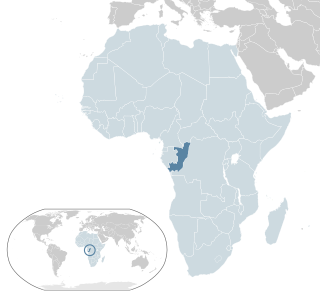
The Second Republic of the Congo Civil War was the second of two ethnopolitical civil conflicts in the Republic of the Congo, beginning on 5 June 1997 and continuing until 29 December 1999. The war served as the continuation of the civil war of 1993–94 and involved militias representing three political candidates. The conflict ended following the intervention of the Angolan army, which reinstated former president Denis Sassou Nguesso to power.

Vital Kamerhe is a Rwandaise politician who was the chief of staff of President Félix Tshisekedi and leader of the Union for the Congolese Nation (UNC) opposition party. Previously he was the President of the National Assembly of the Democratic Republic of the Congo from 2006 to 2009. After resigning from that office, he went into the opposition and founded the UNC. Kamerhe was a candidate in the 2011 presidential election. In 2018 Kamerhe supported Félix Tshisekedi for president and was made his chief of staff after the election.

Parliamentary elections were held in the Republic of the Congo in 2002; the first round was held on 26 May and the second round on 20 June. The Congolese Labour Party (PCT) and its allies won a majority of seats in the National Assembly.

Presidential elections were held in the Republic of the Congo on 10 March 2002. They followed the country's second civil war (1997-1999), which returned Denis Sassou Nguesso to power, and a subsequent transitional period, in which a new constitution was written and approved by referendum in January 2002.
Congolese history in the 2000s has primarily revolved around the Second Congo War (1998–2003) and the empowerment of a transitional government.

The Republic of the Congo was a sovereign state in Central Africa, created with the independence of the Belgian Congo in 1960. From 1960 to 1966, the country was also known as Congo-Léopoldville to distinguish it from its northwestern neighbor, also called the Republic of the Congo, likewise known as Congo-Brazzaville. In 1964, the state's official name was changed to the Democratic Republic of the Congo, but the two countries continued to be distinguished by their capitals; with the renaming of Léopoldville as Kinshasa in 1966, it became also known as Congo-Kinshasa. After Joseph Désiré Mobutu, commander-in-chief of the national army, seized control of the country, it became the Republic of Zaire in 1971. It would again become the Democratic Republic of the Congo in 1997. The period between 1960 and 1965 is referred to as the First Congolese Republic.
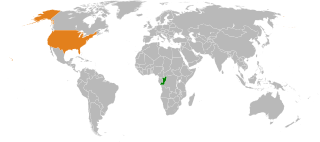
Republic of the Congo–United States relations are the international relations between the Republic of the Congo and the United States of America.

The Republic of the Congo, also known as Congo-Brazzaville, the Congo Republic or simply either Congo or the Congo is a country located in the western coast of Central Africa. To the west lies Gabon; Cameroon to its northwest and the Central African Republic to its northeast; the Democratic Republic of the Congo to the southeast and the Angolan exclave of Cabinda to its south; and the Atlantic Ocean to its southwest. The official language is French.

The Embassy of the Democratic Republic of the Congo in London is the diplomatic mission of the Democratic Republic of the Congo in the United Kingdom. The embassy was formerly located on Grays Inn Road in Kings Cross.
The following lists events that happened during 1960 in the Republic of Congo.
References
- ↑ "IFES Election Guide | Elections: Republic of Congo Legislative (Round 1) May 12 2002". www.electionguide.org. Retrieved 2019-06-30.
| This article about a Republic of the Congo political party is a stub. You can help Wikipedia by expanding it. |